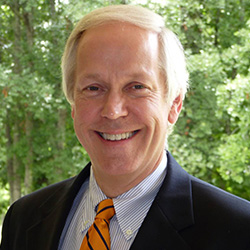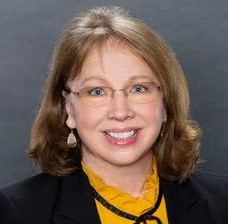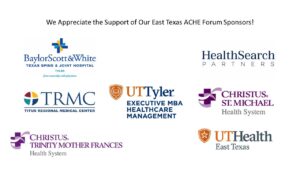
- This event has passed.
Behavioral Healthcare: Approaches to Increase Value for the Organization and Meet Community Needs
May 3, 2023 @ 1:30 pm - 3:00 pm

This panel has been approved for 1.5 Virtual ACHE Face-to-Face credits!
Historically, hospitals and health systems have not always embraced a role in meeting behavioral health needs in communities because managing behavioral healthcare and mental health is very complex. According to the National Alliance of Mental Illness approximately 1 in 5 adults in the U.S.—43.8 million, or 18.5%—experiences mental illness in a given year. The rate of youth with severe depression increased from 5.9% in 2012 to 8.2% in 2015. Nearly half (45 percent) of those with any mental disorder also meet criteria related to having a physical illness or substance abuse. Physical health and mental health issues occur together. For example, people with diabetes or cardiac conditions often develop depression as well. Being able to receive treatment for both conditions through an integrated behavioral health and primary care setting can be especially helpful since how we live our lives (behave) and our physical and mental health all interact with each other in complex ways.
Ultimately, the goals of behavioral health interventions are similar to those of other primary care treatment: helping people function so they can lead healthier, fuller lives. Receiving both behavioral health and primary care treatment in one integrated setting can help people continue to work or attend school, to engage with their families, to participate in their communities, and to be able to thrive. Managing co-morbidities can lead to an increase in cost and potentially a decrease in reimbursement. Mental Health America has reported that while most Americans have access to mental healthcare services through the affordable care act about 56% of individuals with a mental health disorder do not receive treatment. It is noted that in states with low workforce, there is a shortage of mental healthcare providers (psychiatrists, psychologists, social workers, counselors, and psychiatric nurses). As hospitals and healthcare systems begin to make the movement away from volume toward value-based care healthcare executives need to implement best practices to align and coordinate high quality care, reduce utilization in the emergency room, address workforce composition, control costs and meet the ethnic and racial disparities of the community.
Moderator:
George Roberts, FACHE, Chief Executive Officer, Northeast Public Health District
Panelists:
Carol Henson, MS, MPA/HCA, BSN, BSW-IPR, CCM, CHWI, Behavioral Health Administrator, University of Texas Health Science Center at Tyler
Dr. Antionette Lenton, Behavioral Health Physician, Christus Trinity Mother Frances Health System
Loretta Swan, Independent Consultant for various healthcare & legal organizations
Christopher Taylor, Executive Director, Mosaic Counseling Centers of East Texas
Register Here
Speakers Bios:
 Carol Henson, MS, MPA/HCA, BSN, BSW-IPR, CCM, CHWI, is a registered nurse, social worker, certified case manager, community health worker instructor, and youth mentor. As the Behavioral Health Administrator for the University of Texas Health Science Center at Tyler, she provides oversight for planning, coordinating, and administrative activities related to the clinical operations of the behavioral health service line. She also works collaboratively with the behavioral health educational programs in psychiatry and psychology, recruitment of staff and faculty, and external funding initiatives. As a mental health professional, she promotes accessible, available, and affordable mental health care in all communities, mainly rural communities. She thrives on challenges, particularly those that expand the boundaries and invokes change in the status quo regarding minority populations accessing health care timely.
Carol Henson, MS, MPA/HCA, BSN, BSW-IPR, CCM, CHWI, is a registered nurse, social worker, certified case manager, community health worker instructor, and youth mentor. As the Behavioral Health Administrator for the University of Texas Health Science Center at Tyler, she provides oversight for planning, coordinating, and administrative activities related to the clinical operations of the behavioral health service line. She also works collaboratively with the behavioral health educational programs in psychiatry and psychology, recruitment of staff and faculty, and external funding initiatives. As a mental health professional, she promotes accessible, available, and affordable mental health care in all communities, mainly rural communities. She thrives on challenges, particularly those that expand the boundaries and invokes change in the status quo regarding minority populations accessing health care timely.
Mrs. Henson attended college in Tyler, Texas, at Texas College and later the University of Texas at Tyler. She is a fellow of America’s Essential Hospital’s Adaptive Leadership Program and was recognized by the University of Texas at Tyler’s College of Nursing as the 2018 Outstanding Alumni. In 2022, she received the UT Health East Texas North Campus Leader of the Year award.
Community service plays an integral part in Mrs. Henson’s life. She participates in missionary activities like homeless outreach, serving meals at the Salvation Army, and providing toiletries to college students. In addition, she is a member of the Smith County Behavioral Health Leadership Team and the Smith County Jail In-reach project.
 Antoinette Lenton, MD attended the Warren Alpert Medical School of Brown University. During medical school, she commissioned into the United States Army as an Officer through the Health Professions Scholars Program. During her time in the military, she completed her Psychiatry residency program at Tripler Army Medical Center, promoted to the rank of Major and served in several leadership positions to include Substance Use Disorder Clinical Care Consultant, Medical Director of Behavioral Health Clinical Services, Chief Resident of Wellness, and Chief of Inpatient Behavioral Health Unit. She joined the CHRISTUS Trinity Mother Frances Health System in 2022 where she supervises a Psychiatric Nurse Practitioner while also seeing her own panel of patients full time at Behavioral Health Clinic located at the Douglas Clinic.
Antoinette Lenton, MD attended the Warren Alpert Medical School of Brown University. During medical school, she commissioned into the United States Army as an Officer through the Health Professions Scholars Program. During her time in the military, she completed her Psychiatry residency program at Tripler Army Medical Center, promoted to the rank of Major and served in several leadership positions to include Substance Use Disorder Clinical Care Consultant, Medical Director of Behavioral Health Clinical Services, Chief Resident of Wellness, and Chief of Inpatient Behavioral Health Unit. She joined the CHRISTUS Trinity Mother Frances Health System in 2022 where she supervises a Psychiatric Nurse Practitioner while also seeing her own panel of patients full time at Behavioral Health Clinic located at the Douglas Clinic.
 George T. Roberts, Jr., has served as the Chief Executive Officer of the Northeast Texas Public Health District (NET Health) since November 2006. Services provided by NET Health include Community Outreach, Disease Surveillance, Environmental Health, Immunization, Tuberculosis Control, Public Health Emergency Preparedness, Regional Laboratory, Vital Statistics, and WIC (Women, Infants, and Children) Program. The Health District primarily serves Tyler and Smith County but also provides some services in 21 counties in East Texas. The WIC Program serves a 20 county area and Public Health Preparedness serves a 7 county region.
George T. Roberts, Jr., has served as the Chief Executive Officer of the Northeast Texas Public Health District (NET Health) since November 2006. Services provided by NET Health include Community Outreach, Disease Surveillance, Environmental Health, Immunization, Tuberculosis Control, Public Health Emergency Preparedness, Regional Laboratory, Vital Statistics, and WIC (Women, Infants, and Children) Program. The Health District primarily serves Tyler and Smith County but also provides some services in 21 counties in East Texas. The WIC Program serves a 20 county area and Public Health Preparedness serves a 7 county region.
Mr. Roberts has over 40 years of health care experience, the majority of which was spent in hospital administration, having previously served at Baylor University Medical Center in Dallas, Mother Frances Hospital in Tyler, and Henderson Memorial Hospital in Henderson, Texas. He received his Bachelor of Business Administration from SMU in Dallas and a Master’s Degree in Health Administration from Washington University School of Medicine in St. Louis, Missouri. He is a Fellow in the American College of Health Care Executives (ACHE), and he currently serves as President of the East Texas ACHE Chapter. He is a member of the Board of the American Board of Preventive Medicine, the Texas Health Institute, Carter BloodCare, the Piney Woods Regional Advisory Council, and the Tyler Area Chamber of Commerce. He is Past President of the National Association of County and City Health Officials (NACCHO) and the Texas Association of City and County Health Officials (TACCHO), and the Past Chairman of the Texas Health Institute. Mr. Roberts is active in a number of church, community, and statewide efforts. Mr. Roberts has been married to his wife Leslie for 35 years, and they have 2 children – Claire (30) and Travis (26).
 Loretta Swan has over twenty years of healthcare administration experience, including:
Loretta Swan has over twenty years of healthcare administration experience, including:
o Coordinating the creation of an FQHC clinic.
o Working as practice administrator for various healthcare facilities, including serving as the VP for healthcare operations for a system with over 350+ physicians and ~1000 employees and provided administrative supervision of operational activity for multiple clinics and strategic planning.
o Recruiting physicians.
o Collaborating with a team at various healthcare clinics to implement EMRs, including EPIC.
o Directing and implementing a billing service for out-of-state physicians.
o Spearheading multi-specialty physician group mergers and developing the central business office operations.
o Implementing medical coding auditing and training teams to ensure organizational compliance.
o Providing healthcare consulting services.
• Most recently, served as the Dean over the Professional and Technical Programs at TJC, training ~5000 students. The programs consisted of 42 degrees and certificates and had 14 Dept. Chairs.
• Currently and in the past, she has also served on various boards (healthcare, academic, religious and other community) and volunteer for CASA and at small healthcare clinics assisting with their revenue cycle.
 Chris Taylor is a native Tylerite who currently serves as the Executive Director of Mosaic Counseling Centers of East Texas – a nonprofit organization that delivers therapeutic mental healthcare to East Texans across more than 35 counties. Mosaic focuses on improving affordability and accessibility of care by offering discounted fees based on household income as well as supervised care provided by qualified graduate interns. Mosaic also accepts most insurance and community partnerships, offering care in person and by secure video. Prior to this role, Chris served as the Executive Director of the Cherokee County Department of Public Health, and represented rural public health in Austin and Washington D.C. Chris was a founding member and first Secretary of the Texas Association of City and County Health Officials, and member of the National Association of City and County Health Officials, where he was chosen to complete a senior fellowship in public health leadership. Chris is currently the Chair of the Tyler Chamber of Commerce Medical Committee. Chris has a Master’s in Public Administration from UT Arlington and a Bachelor’s in Political Science form UT Tyler, and is also a credentialed mediator/arbitrator in the State of Texas. Chris and his wife Stephanie (Executive Director of the Alzheimer’s Alliance of Smith County) have four children ages 13-22.
Chris Taylor is a native Tylerite who currently serves as the Executive Director of Mosaic Counseling Centers of East Texas – a nonprofit organization that delivers therapeutic mental healthcare to East Texans across more than 35 counties. Mosaic focuses on improving affordability and accessibility of care by offering discounted fees based on household income as well as supervised care provided by qualified graduate interns. Mosaic also accepts most insurance and community partnerships, offering care in person and by secure video. Prior to this role, Chris served as the Executive Director of the Cherokee County Department of Public Health, and represented rural public health in Austin and Washington D.C. Chris was a founding member and first Secretary of the Texas Association of City and County Health Officials, and member of the National Association of City and County Health Officials, where he was chosen to complete a senior fellowship in public health leadership. Chris is currently the Chair of the Tyler Chamber of Commerce Medical Committee. Chris has a Master’s in Public Administration from UT Arlington and a Bachelor’s in Political Science form UT Tyler, and is also a credentialed mediator/arbitrator in the State of Texas. Chris and his wife Stephanie (Executive Director of the Alzheimer’s Alliance of Smith County) have four children ages 13-22.
Register Here
